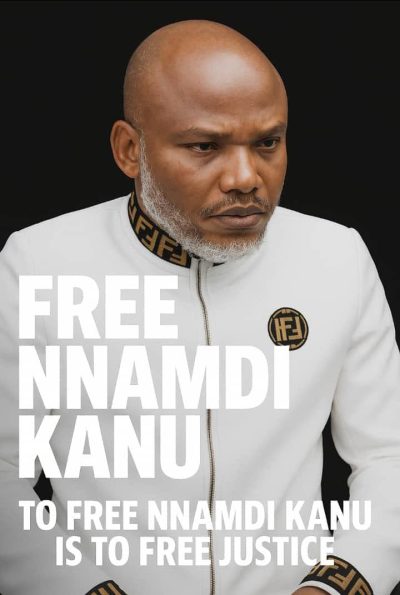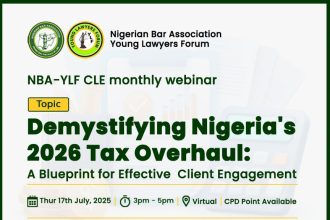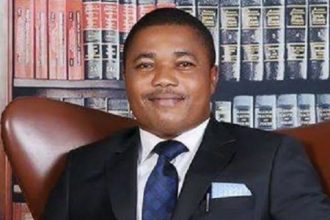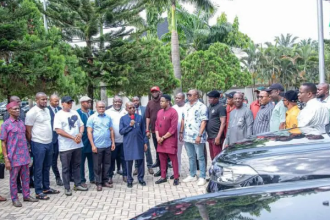The detained leader of the proscribed Indigenous People of Biafra (IPOB), Mazi Nnamdi Kanu, has notified the Federal High Court in Abuja of his readiness to open his defence in the long-running trial where he faces charges bordering on treasonable felony and alleged acts against the Nigerian state.
In a motion filed before the court and dated October 21, 2025, Kanu declared that he is “prepared to commence his defence” in compliance with the order of the court made on October 16, 2025, which directed him to open his case on October 24, 2025.
This development comes amid renewed public attention following the #FreeNnamdiKanuNow protests led in Abuja by human rights activist Omoyele Sowore, calling for his immediate release in line with several previous court rulings.
Kanu Declares Readiness to Begin Defence
In the motion personally signed by him, Kanu stated that he intends to proceed with his defence as directed by the court, even though he had earlier filed a preliminary objection challenging the court’s jurisdiction to continue hearing the matter. That objection, filed earlier this month, came on the same day a panel of court-appointed medical experts declared him medically fit to stand trial.

Quoting directly from his motion, Kanu said:
“Pursuant to the order of this honourable court made on the 16th day of October 2025, directing the defendant to commence his defence on the 24th day of October 2025, I am ready to do so.”
He added that his decision to comply was motivated by his desire to ensure that the trial proceeds in line with due process and that “justice is not only done but seen to have been done.”
IPOB Leader to Call 23 Witnesses
In his filing, Nnamdi Kanu disclosed that he intends to call 23 witnesses to testify in his defence. He categorised them into two groups — “ordinary but material witnesses” and “vital and compellable witnesses.”
Among those listed as compellable witnesses are several high-profile Nigerians, including:
- Gen. Theophilus Danjuma (retd) – Former Minister of Defence
- Gen. Tukur Yusuf Buratai (retd) – Former Chief of Army Staff
- Nyesom Wike – Minister of the Federal Capital Territory (FCT)
- Hope Uzodinma – Governor of Imo State
- Babajide Sanwo-Olu – Governor of Lagos State
- Dave Umahi – Minister of Works
- Dr. Okezie Ikpeazu – Former Governor of Abia State
- Abubakar Malami (SAN) – Immediate past Attorney General of the Federation
- Ahmed Rufai Abubakar – Former Director-General, National Intelligence Agency (NIA)
- Yusuf Magaji Bichi – Director-General, Department of State Services (DSS)
The IPOB leader noted that these individuals, among others, would be summoned under Section 232 of the Evidence Act, 2011, to provide crucial testimonies that would “clarify the political and factual context” of his actions and statements which the prosecution alleges amount to treasonable felony.

“The second category of witnesses shall be summoned under Section 232 of the Evidence Act, 2011,” Kanu wrote, suggesting that his defence intends to compel the appearance of public officials and security chiefs who played direct roles in the events leading to his arrest and detention.
Kanu Requests 90 Days to Conclude Defence
Given the number of witnesses and the scope of evidence to be presented, Kanu has asked the court, presided over by Justice James Omotosho, to grant him a 90-day timeframe to conclude his defence.
He further informed the court that he would personally testify in his defence, explaining that he wishes to provide a sworn account of his statements and activities to counter the prosecution’s narrative.
“I shall testify on my own behalf, providing a sworn account of the facts, denying the allegations, and explaining the political context of my statements and actions,” he affirmed.
Kanu also assured the court that all his voluntary witnesses would submit sworn witness statements on oath, and that his defence team would ensure the trial proceeds expeditiously without unnecessary delays.
“It would interest the honourable court and the public that justice is not only done but seen to have been done,” he added.
Arrest, Detention, and Prolonged Trial
Nnamdi Kanu, who was initially arrested in 2015 and later fled Nigeria, was re-arrested in Kenya in 2021 under controversial circumstances and returned to Nigeria to face trial. His continued detention by the Department of State Services (DSS) despite multiple court orders for his release has attracted local and international condemnation, including from human rights organisations and foreign observers.
The Federal Government accuses Kanu of making inflammatory broadcasts and inciting violence through the Radio Biafra platform, while his supporters argue that his actions constitute lawful agitation for self-determination, protected under international human rights law.
The trial has since become one of the most politically charged and closely monitored cases in Nigeria’s modern legal history.
Ejimakor, Kanu’s Lawyer, and Others Remanded Over Protest
Meanwhile, on the same day Kanu filed his motion to open defence, a Magistrate Court in Abuja ordered the remand of 13 individuals, including Barrister Aloy Ejimakor, Kanu’s special counsel, who was arrested alongside others during a #FreeNnamdiKanuNow protest in Abuja.
Those remanded include Kanu’s brother, Prince Emmanuel Kanu, and eleven others identified as Joshua Emmanuel, Wilson Anyalewechi, Okere Kingdom Nnamdi, Clinton Chimeneze, Gabriel Joshua, Isiaka Husseini, Onyekachi Ferdinand, Amadi Prince, Edison Ojisom, Godwill Obioma, and Chima Onuchukwu.
They were charged with offences bordering on criminal conspiracy, disobedience to lawful order, inciting disturbance, and public nuisance, in violation of Sections 152, 114, and 113 of the Penal Code.
After briefly standing down the matter, the magistrate ordered their remand at the Kuje Correctional Centre pending arraignment scheduled for October 24, 2025 — the same day Kanu is expected to begin his defence before the Federal High Court.
Implications and Public Reaction
Tuesday’s twin developments — the filing of Kanu’s motion to open defence and the remand of his lawyer and family members — mark a critical turning point in the protracted legal and political battle surrounding the IPOB leader’s case.
Human rights observers and political analysts have noted that the coming days will be pivotal, particularly as the court reconvenes on October 24, a date now significant both for Kanu’s trial and the ongoing protests for his release.
While Kanu’s supporters insist that his prosecution is politically motivated and targeted at silencing the Biafra movement, government officials maintain that the rule of law must prevail and that no individual, regardless of popularity or cause, is above the law.









